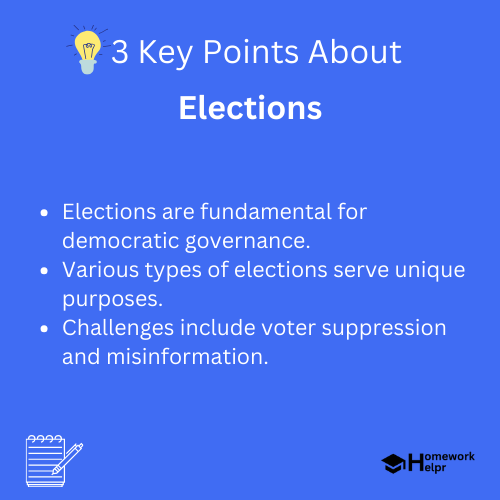📝 Summary
Elections are a fundamental aspect of any democratic system, providing citizens the power to choose their leaders and voice opinions. They ensure representation, promote civic responsibility, and enhance government accountability. Various types of elections, such as general, primary, local, and presidential elections, play crucial roles. The electoral process includes stages like voter registration, candidacy declaration, campaigning, voting, and counting votes. Elections impact public policy and governance while facing challenges like voter suppression and misinformation. Understanding and actively participating in elections is vital for a healthy democracy.
Elections: The Power of Choosing Leaders
Elections are a fundamental aspect of any democratic system. They provide citizens with the power to choose their leaders and voice their opinions on crucial issues affecting their society and future. Through elections, people can select representatives who will advocate for their interests, uphold their rights, and make decisions that influence their everyday lives. This article will delve into the various types of elections, their importance, the electoral process, and the impact they have on society.
Types of Elections
There are several types of elections that play critical roles in a democracy. Each serves a unique purpose and has its own set of rules and procedures. The major types of elections include:
- General Elections – These elections are held to choose representatives at various levels, such as local, state, and national governments. In a general election, citizens vote for candidates representing political parties, and the party with the majority often forms the government.
- Primary Elections – These are held by political parties to determine their candidates for the general elections. Voters within each party select who they want to represent them.
- Local Elections – Local elections involve selecting mayors, council members, and local officials. These elections directly influence the community and its governance.
- Presidential Elections – In countries with a presidential system, citizens vote to elect the head of state. The presidential election is usually held separately from other elections and garners the most public attention.

Definition
Democratic: Related to a system of government where the citizens exercise power by voting.
The Importance of Elections
Elections are crucial in a democratic society for multiple reasons. Firstly, they ensure representation. By participating in elections, citizens can elect officials who align with their values and beliefs, leading to better representation of diverse opinions.
Secondly, elections promote civic responsibility and engage citizens in the political process. Voting is not just a right; it’s a duty that empowers individuals to actively participate in shaping their community and government. Moreover, elections enhance government accountability as elected officials must answer to their constituents and uphold their promises.
Examples
In many countries, election campaigns include promises from political candidates regarding health care, education, and infrastructure, compelling them to keep their commitments or face backlash in future elections.
The Electoral Process
The electoral process encompasses several stages, ensuring fairness and transparency in elections. The stages generally include:
- Voter Registration – Citizens must register to vote in order to participate. This process may vary based on location, but it typically includes providing identification and proof of residence.
- Candidacy – Individuals who wish to run for office must declare their candidacy and meet certain eligibility criteria, often involving background checks and the submission of petitions.
- Campaigning – Candidates engage in campaigns to promote their platforms and persuade voters. This phase often includes rallies, debates, and advertisements.
- Voting – On election day, registered voters cast their ballots, either in person or through mail-in voting.
- Counting Votes – After the polls close, election officials count the votes to determine the winners.
Definition
Accountability: The obligation of an individual or organization to account for its activities and accept responsibility for them.
The Impact of Elections
Elections have far-reaching implications for society. They not only determine who holds political power but also shape public policy and governance. The results of elections can influence issues such as healthcare, education, and environmental policy.
Moreover, the manner in which elections are conducted can significantly affect the public’s trust in institutions. Transparent and fair elections reinforce confidence in democratic systems, whereas allegations of fraud or manipulation can lead to civil unrest and diminish trust.
❓Did You Know?
Did you know that the first known democratic election took place in Ancient Greece in 508 B.C.? Back then, citizens voted by raising their hands, a far cry from our modern ballot systems!
Challenges in Elections
Misinformation campaigns, especially through social media, can mislead voters about candidates and policies. This distortion can have significant consequences on electoral outcomes. Lastly, electoral fraud, although rare in many contexts, can deeply affect trust and democratic integrity.
Examples
In various countries, reports have surfaced about misinformation spreading via social media platforms during election seasons, leading to confusion and controversy over candidates’ statements and intentions.
Conclusion
In summary, elections are a vital component of democracy, allowing citizens to exercise their right to choose their leaders and influence governance. They come in various forms and entail a rigorous process aimed at ensuring fairness and transparency. While elections have the power to bring about positive change, they also face challenges that can compromise their integrity. Understanding the electoral process and actively participating in elections is essential for fostering a healthy democracy. So, the next time you step into a voting booth, remember the importance of your vote and how it shapes the future.
Related Questions on Elections
What are the different types of elections?
Answer: General, primary, local, and presidential elections.
Why are elections important in a democracy?
Answer: They ensure representation and promote civic responsibility.
What challenges do elections face?
Answer: Issues include voter suppression and misinformation.
How does the electoral process work?
Answer: It includes voter registration, candidacy, campaigning, voting, and counting votes.
